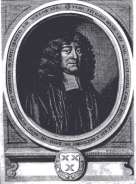I often recall a comment by a history teacher when I was at primary school. It was simultaneously blindingly obvious and profound:
‘People in the past thought the same way we do, and were no less clever than we are – it’s just that we know more.’
Each week brings a further reminder of that wisdom.
My forebear Joseph Glanvill (pictured), philosopher and religious sceptic, was a member of London’s Royal Society.
I could admire him simply for that, and the fact he coined the phrase ‘climate of opinion’ and hunted ghosts with the alacrity of Derek Acorah. But his book ‘The Vanity Of Dogmatising‘ (and what a title that remains) offers extraordinary musings on the Shape of Things to Come.
He predicts, amongst other things, air travel and space flight, before turning his attention to remote human communication:
‘That men should confer at very distant removes by an extemporary intercourse is a reputed impossibility; but yet there are some hints in natural operations that give us probability that ’tis feasible, and may be compassed without unwarrantable assistance from demoniac correspondence.’
(We still sometimes have a devil of a job finding network coverage, Joseph.) He continues:
‘That a couple of needles equally touched by the same magnet being set in two dials, exactly proportioned to each other, and circumscribed by the letters of the alphabet, may effect this “magnale” [mighty work] hath considerable authorities to avouch it.’
He elaborates: ‘Let the friends that would communicate take each a dial; and, having appointed a time for their sympathetic conference, let one move his impregnate needle to any letter in the alphabet, and its affect fellow will precisely repeat the same.’ And hey presto, folks can go 121 on different sides of the globe.
Joseph recognised his ‘magnetick efficiency’ and ‘Abecederian circle’ required a little tweaking (QWERTY keyboard, predictive text, anyone?), but asserted ‘it may hereafter with success be attempted, when magical history shall be enlarged by riper inspection; and ’tis not unlikely but that present discoveries might be improved to the performance.’
Foreseeing the process that would lead to the telegraph, the telephone, the internet, mobile telephony and instant messaging is all very well, until you consider that Joseph Glanvill was writing in 1661.
That is 155 years before Richard Babbage conceived his ‘difference engine’, 175 years before Samuel Morse unveiled his Morse Code, and 350 years before Microsoft bought Skype for $8.5bn.

